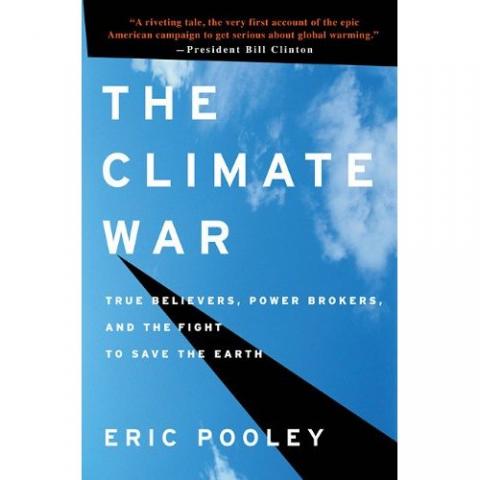The first question I had for author Eric Pooley after I finished reading his new book, The Climate War, was whether he had set up hidden cameras all over Washington, DC.
He didn’t of course, but the insider information he weaves into his story about the ongoing battle for effective climate policy both in the United States and internationally will make even the insiders feel inadequate.
The Climate War puts you at the power-broker’s table, with much of the book following two main characters who have been at the center of the debate and the controversy around climate policy for more than a decade – Fred Krupp, Executive Director of Environmental Defense Fund and Jim Rogers, CEO of Duke Energy.
Both Krupp and Rogers are polarizing figures within the climate advocacy community, with Krupp being accused of “selling out” to the big corporate machine and willing to accept inadequate policy fixes and Rogers being accused of greenwashing the company he heads which is one of the largest electrical generation companies in the United States.
Krupp and Rogers act as the central characters and around them Pooley wraps the history of how we have gotten to where we are today on the issue of climate change, ending with the failure to come to an international climate treaty in Copenhagen, Denmark in late December, 2009.
We learn more about the “deniers” and the corporate flaks that back them, like Myron Ebell at the Competitive Enterprise Institute, who toasted a crowd with Fiji Water because,
“It comes to you direct from Fiji, so it’s very energy inefficient: the only thing that could improve it would be to carbonate it.
In this book you learn about the roots of Al Gore’s high profile organization, the Alliance for Climate Protection, the dirty coal lobby’s presidential campaign push, Van Jones and Green for All, the United States Climate Action Partnership and many of the other big players, like John Podesta, the head of the influential Center for American Progress who is quoted in The Climate War as telling the leaders of the major environmental organizations that they were losing the war on climate because,
“the enviros’ extreme focus on the fine print of climate policy was preventing them from seizing this opportunity to communicate with the public. They had to pull themselves ‘out of the weeds’ and connect to things that mattered in people’s lives. ‘You guys are focused on the footnotes and the amendments and you’re blowing this whole year! if you’re not arguing this in big, transformational terms, you’re going to get killed.”
While much has been written about these people, groups and the issue of climate change, the difference is that Pooley, who is also the Deputy Editor of Bloomberg Business Week, writes it in a true investigative reporting style with lots of detail and little judgment.
It is a book for anyone active on the issue of climate change to better understand why things have unfolded the way they have and it also a book for the lay person looking to understand why things have become so complicated.
The Climate War was three years in the making and Pooley deserves a lot of credit for actually finishing the book, given the fact that witnessing first-hand the politics of climate change would leave most people doing nothing more than banging their against the wall.
Subscribe to our newsletter
Stay up to date with DeSmog news and alerts







